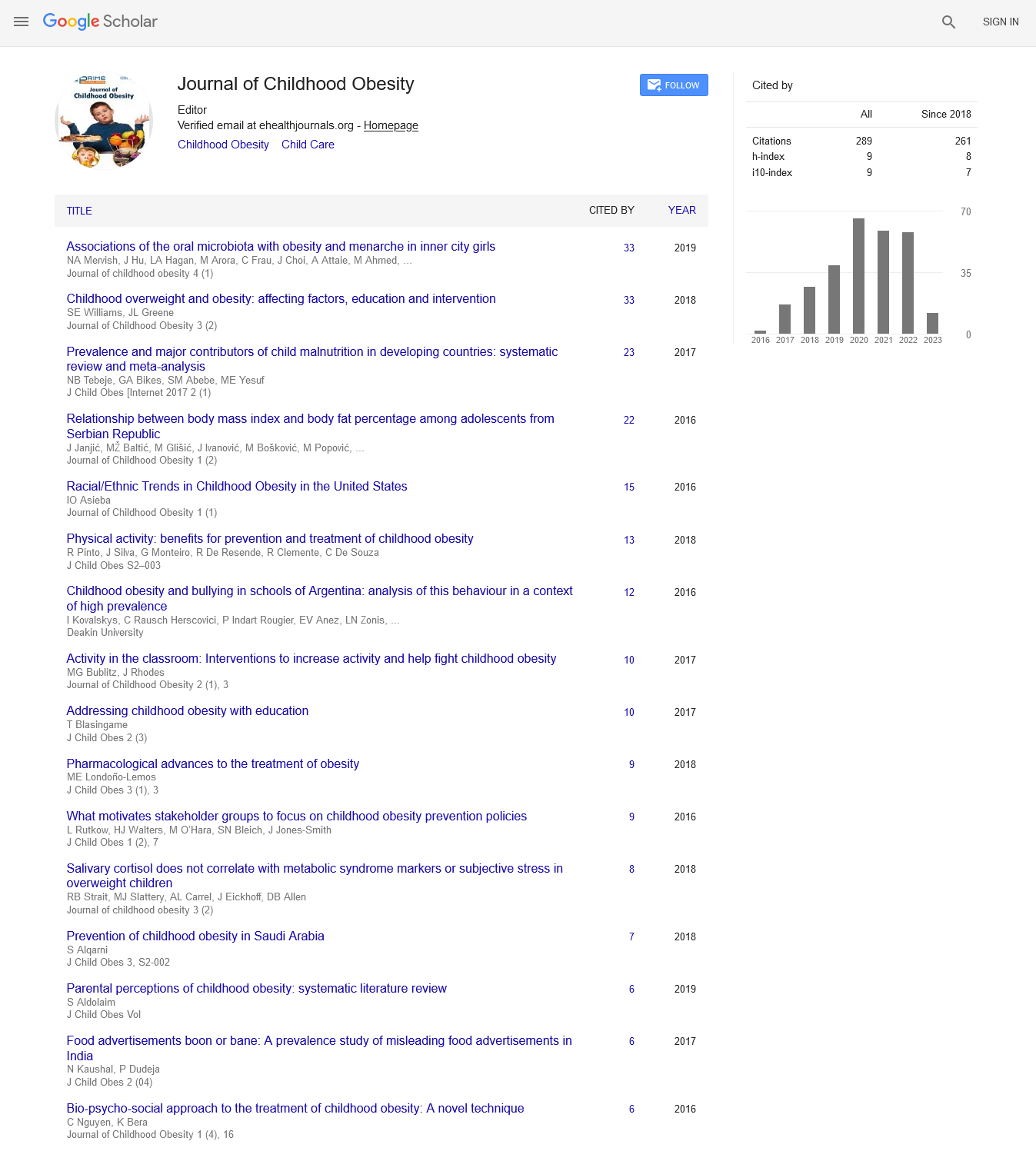Perspective - (2023) Volume 8, Issue 4
Understanding Kids' Leptin: The Hormone That Regulates Appetite
Sarah Henry*
Department of Nutrition, University of Washington, United States
*Correspondence:
Sarah Henry,
Department of Nutrition, University of Washington,
United States,
Email:
Received: 01-Aug-2023, Manuscript No. ipjco-23-17780;
Editor assigned: 03-Aug-2023, Pre QC No. ipjco-23-17780 (PQ);
Reviewed: 17-Aug-2023, QC No. ipjco-23-17780;
Revised: 22-Aug-2023, Manuscript No. ipjco-23-17780 (R);
Published:
29-Aug-2023, DOI: 10.21767/2572-5394-23.8.43
Introduction
Leptin often referred to as the satiety hormone, plays a significant
role in regulating appetite and body weight in both adults
and children. While this hormone has garnered considerable
attention in the context of obesity and weight management in
adults, its role in children’s health and development is equally
important. In this article, we will explore what leptin is, its
functions in kids’ bodies, and the implications of leptin-related
issues in childhood. Leptin is a hormone produced by adipose
(fat) tissue and released into the bloodstream. Its primary function
is to communicate with the brain’s hypothalamus region,
specifically the arcuate nucleus, to regulate appetite and energy
balance. Leptin acts as a signal to the brain, conveying information
about the body’s energy stores. Leptin helps regulate
appetite by signaling to the brain when the body has sufficient
energy stores, reducing hunger and promoting feelings of fullness.
Leptin assists in maintaining energy balance.
Description
When energy intake (calories consumed) matches energy expenditure
(calories burned), leptin levels are in balance, and
weight remains stable. Leptin is involved in the growth and development
of children, particularly during puberty. It helps ensure
that energy resources are allocated appropriately to support
growth. Leptin also has immune-regulatory functions and
plays a role in the body’s response to infections and illnesses.
Childhood obesity has become a global health concern, with
numerous factors contributing to its development. Leptin resistance,
a condition where the brain does not respond effectively
to leptin’s signals, can be a contributing factor to childhood
obesity. This resistance can lead to increased appetite,
reduced feelings of fullness, and overeating, ultimately contributing
to weight gain. Genetic factors can predispose some
children to develop leptin resistance. As adipose tissue produces
leptin, children with excess body fat may have higher levels
of leptin circulating in their blood. Over time, this can lead to
reduced sensitivity to leptin’s signals. Diets high in sugar and
processed foods have been associated with leptin resistance.
These diets can lead to chronic inflammation and interfere with
leptin signaling. Sedentary behavior and a lack of physical activity
can contribute to leptin resistance. Leptin-related issues,
particularly leptin resistance, can have significant implications
for children’s health and well-being: Leptin resistance can result
in an increased appetite and a reduced feeling of fullness,
leading to overeating and weight gain. Children with leptin resistance
are at a higher risk of becoming overweight or obese,
which can have long-term health consequences. Leptin resistance
is often associated with metabolic dysregulation, including
insulin resistance and an increased risk of developing type
2 diabetes.
Conclusion
Teach stress management techniques to help children cope
with stress and reduce the risk of emotional eating. If a child
is struggling with weight issues and shows signs of leptin resistance,
it is essential to consult a healthcare provider. They
can assess the child’s health and recommend appropriate interventions.
Engage the entire family in adopting a healthier
lifestyle, as family support is essential for success. Leptin is a vital
hormone in regulating appetite, energy balance, and overall
health in children. Understanding its role and the factors that
can lead to leptin resistance is crucial in addressing childhood
obesity and promoting healthy habits. By encouraging a balanced
diet, regular physical activity, and a supportive environment,
parents and caregivers can help children develop a positive
relationship with food and support their long-term health
and well-being. Early intervention and healthy lifestyle choices
are a key to ensuring that leptin-related issues do not adversely
affect a child’s growth and development.
Citation: Henry S (2023) Understanding Kids’ Leptin: The Hormone That Regulates Appetite. J Child Obesity. 8:43.
Copyright: © 2023 Henry S. This is an open-access article distributed under the terms of the Creative Commons Attribution License, which permits unrestricted use, distribution, and reproduction in any medium, provided the original author and source are credited.

